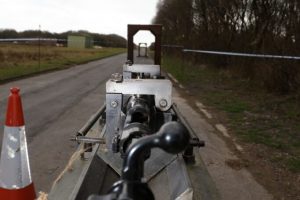Mobile testing units for frontline workers
ESSENTIAL WORKERS and the most vulnerable will receive increased access to coronavirus tests after the government unveiled a network of mobile testing units to travel where there is significant demand, including care homes, police stations and prisons.
The number of new mobile units is being scaled up after a successful pilot last week, which saw Department of Health and Social Care vehicles refitted to fully functioning testing sites, following a design developed by the Royal Engineers of the British Army. Today, there are 8 existing mobile units carrying out tests across the country, including in Salisbury, Southport and Teesside.
Mobile facilities can be set up in under 20 minutes, allowing the testing of hundreds of people each day and are now travelling to those most in need and hard to reach. Specially trained Armed Forces personnel will collect swabs at the mobile sites, before they are sent to mega-labs for processing. Those tested will receive results within 48 hours.
Rapid expansion of a network of mobile test units is now underway, with new units being fielded in the coming weeks and at least 96 ready to be deployed by the start of May.
This follows the announcement last week that other frontline workers would join the priority list for coronavirus testing, alongside the existing commitment to make sure patients and NHS staff are tested for the virus.
New mobile sites will travel to frontline workers in places including:
- care homes
- police stations
- prisons
- benefits centres
- fire and rescue services
Testing Minister Lord Bethell said:
Everyone who needs a coronavirus test should be able to have access to one. New mobile testing units will travel the country to provide vital frontline workers with tests so those testing negative to safely return to work.
We have built up capacity in the system with new testing facilities backed by Britain’s world-class scientists and industry partners. This means more workers can know if they have coronavirus if they have been demonstrating symptoms.
Testing is key in our battle against coronavirus. We now have the ability to provide more people with the certainty they need to get back to the front line when it is safe to do so.
Defence Secretary Ben Wallace said, "Our Armed Forces will help deliver testing to where it’s most needed, using a network of up to 96 mobile units that will be rolled out in the coming weeks. They will make sure our care sector get the testing required to remain in the frontline of the fight against this pandemic."
National Testing Coordinator John Newton said, "Across the country we are creating new infrastructure to rapidly increase our capacity to test for coronavirus. New mobile testing units will help us achieve our goal of 100,000 coronavirus tests a day, providing tests to vital frontline workers wherever they need them.
"In a matter of weeks we have worked with Britain’s leading scientists, academics and industry partners to build scores of new testing facilities and Britain’s largest network of diagnostic labs in history. Each day we are delivering more coronavirus tests, and allowing more frontline staff testing negative for the virus to safely return to work."
The government’s objective is to deploy 96 mobile testing units during the month of May – 92 will be staffed by the Armed Forces and a further 4, located in Northern Ireland, will be operated by civilian contractors.
Earlier this month the Health Secretary Matt Hancock announced the UK government’s 5-pillar plan to rapidly scale up coronavirus testing across the UK. The new 5-pillar plan outlines the ambitions to:
- pillar 1: scale up swab testing in PHE labs and NHS hospitals for those with a medical need and the most critical workers to 25,000 a day in England, with the aligned testing strategies of the NHS in the devolved administrations benefiting from PHE’s partnership with Roche through a central UK allocation mechanism
- pillar 2: deliver increased commercial swab testing for critical key workers in the NHS across the UK, before then expanding to key workers in other sectors. There are now more than 30 drive-through sites collecting these samples across the UK
- pillar 3: develop blood testing to help know if people across the UK have the right antibodies and so have high levels of immunity to coronavirus
- pillar 4: conduct UK-wide surveillance testing to learn more about the spread of the disease and help develop new tests and treatments
- pillar 5: create a new national effort for testing, to build a mass-testing capacity for the UK at a completely new scale
HSM publishes a weekly eNewsletter, delivering a carefully chosen selection of the latest stories straight to your inbox.
Subscribe here






